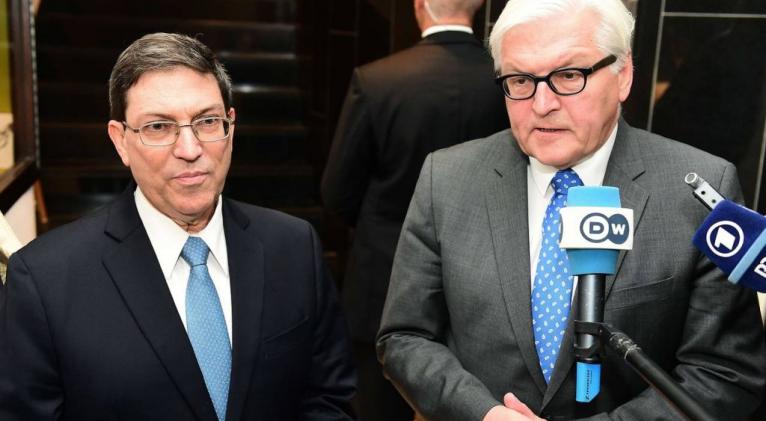Germany and Cuba See Benefits of Rapprochement

On the eve of a summit between the European Union and Latin America, the foreign ministers of Germany and Cuba said thawing relations between Havana and the West could provide some much-needed stability during a period of global unrest.
Frank-Walter Steinmeier, Germany’s foreign minister, said improving ties between the U.S. and Cuba set the stage for broader progress. “We in Europe, and we in Germany, are happy that many decades of standstill and silence are coming to an end,” Mr. Steinmeier told reporters.
He added that the warming of relations sends a good signal of “de-escalation and relaxation.” Mr. Steinmeier said he had accepted an invitation from his counterpart, Cuban foreign minister Bruno Rodriguez Parilla, to visit Havana later this year.
Mr. Rodriguez suggested improved relations could bring economic benefits for both sides. “The modernization of the Cuban economy also presents an opportunity for the German economy,” he said.
The two ministers met a day before dozens of heads of state and government from Europe, Latin America and the Caribbean were to gather in Brussels. The discussion is expected to focus in large part on trade and the economy, but subjects like the rapprochement with Cuba and concerns about Venezuela’s hard-line regime are likely to crop up, informally at least.
U.S. President Barack Obama said in December that the U.S. would move toward restoring diplomatic relations with Cuba, ending a half-century of hostility between the two countries. That has given momentum to the EU’s continuing talks with the island nation.
Europe’s relations with Cuba were not as antagonistic as those between the U.S. and Cuba, and the two were already discussing ways to improve ties in areas like trade and human rights.
Those talks accelerated following Mr. Obama’s announcement. Federica Mogherini, the EU foreign policy chief, visited Cuba earlier this year, while Mr. Rodriguez came to Brussels in April.
The EU and Cuba are seeking a framework agreement, which, among other things, would establish regular meetings between high-ranking ministers of the two sides. EU officials hope to reach a deal by year’s end, and they recently said the next EU-Cuba meeting will be next week.
But relations haven’t always been smooth. Europe has regularly protested alleged human-rights violations by the Cuban regime. In 2003, the EU suspended ties with Cuba after then-President Fidel Castro imprisoned scores of dissidents in a crackdown known as Black Spring.
Relations resumed in 2008 when Raúl Castro took over from his brother and sent signals he was interested in reform. Since then, the Black Spring prisoners have been released and the EU has committed to spending about $67 million in Cuba on such projects as post-hurricane construction and renewable energy.
The EU is now Cuba’s second-biggest trading partner, accounting for about 20% of the island’s total trade. Roughly one-third of the tourists visiting the island each year come from the European Union.













Add new comment